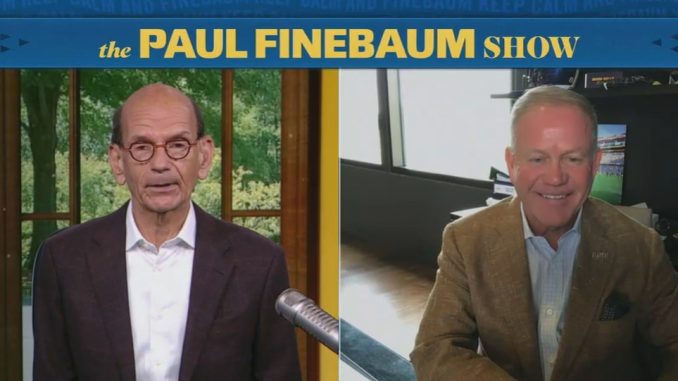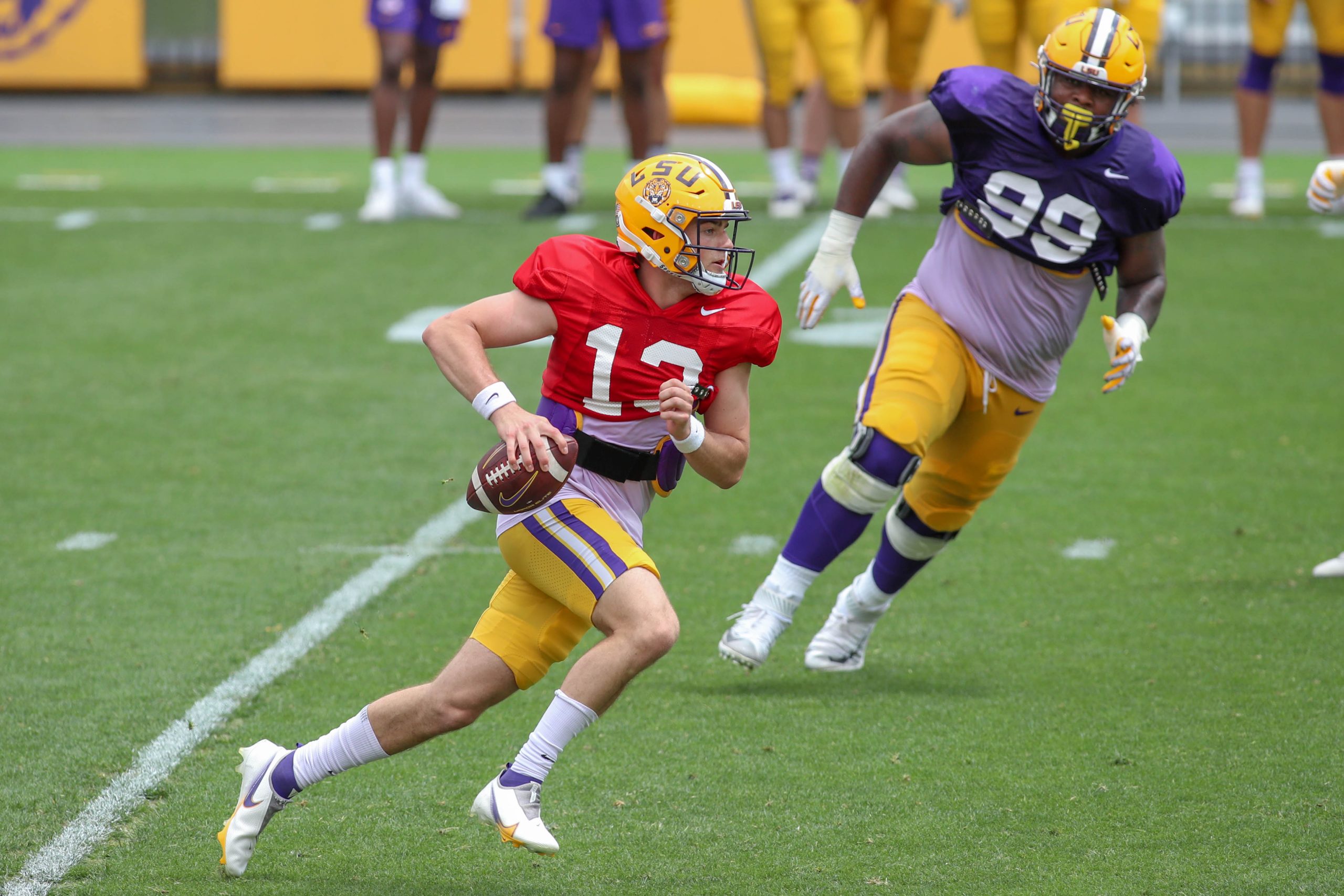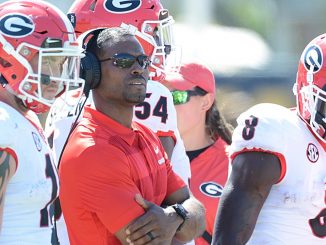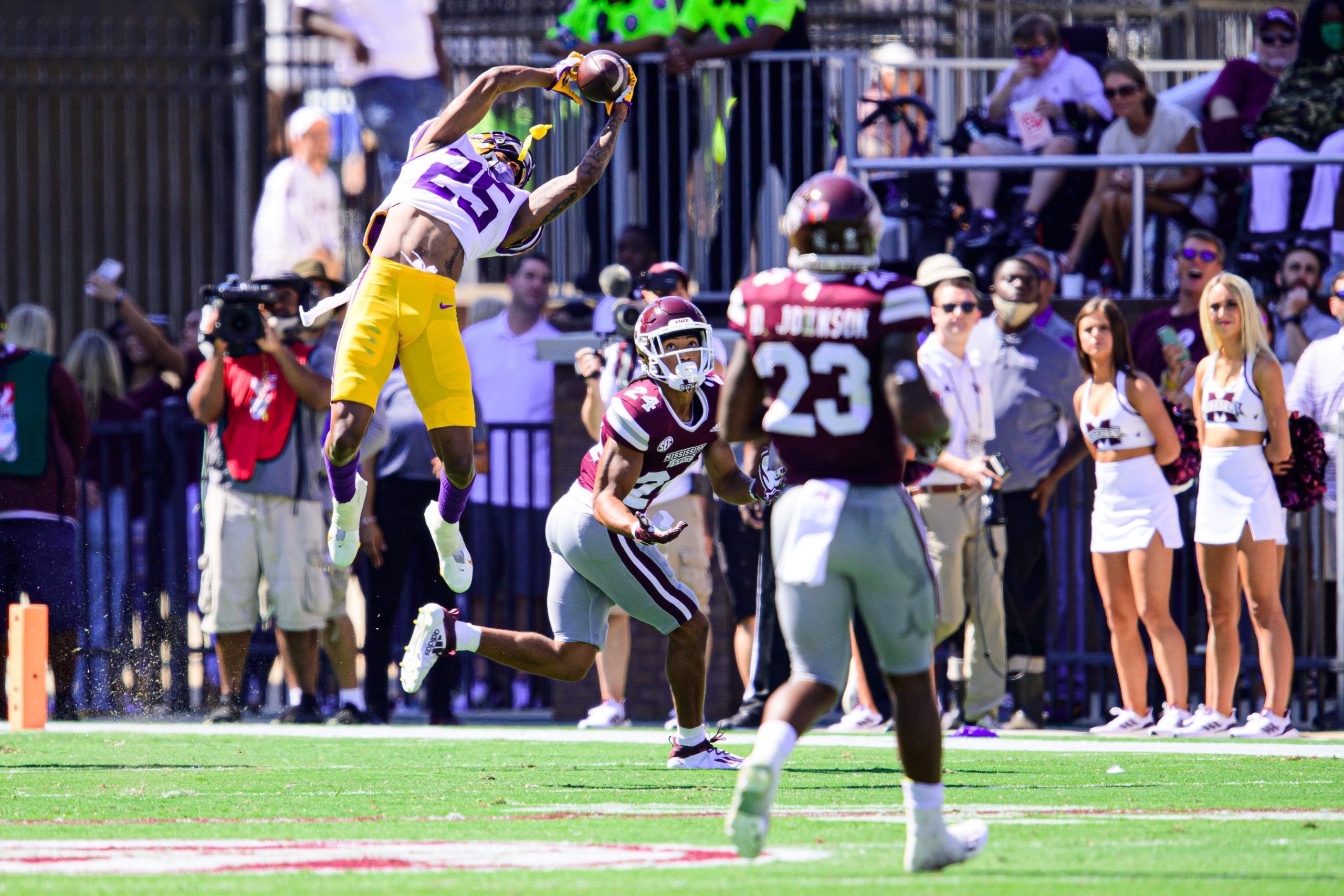
ESPN host Paul Finebaum welcomed LSU head coach Brian Kelly on his show Monday afternoon to discuss the Tigers’ upcoming SEC game against Vanderbilt. Despite a tough season, Kelly remained positive and praised the consistency of his upcoming opponent’s program.
Finebaum asked about the recent losses and disappointment from LSU fans, to which Kelly admitted he and they shared the same feelings and were determined to turn things around. He highlighted the need for more scoring and less explosive plays given up on defense.
When asked about dealing with adversity in his career, Kelly emphasized the importance of great leadership and evaluating their process. He acknowledged that changes may need to be made, but ultimately it comes down to players executing when it matters most.
Kelly also mentioned seeking feedback from his team in order to make necessary improvements. As they navigate through a difficult time, the focus remains on preparing for each game and finding ways to come out on top, Kelly said.
FULL TRANSCRIPT:
Paul Finebaum: Coach Brian Kelly, welcome. Good afternoon, thanks for being here on what I’m sure is a very difficult and busy day, trying to get ready for yet another SEC game.
Brian Kelly: Good afternoon. No doubt, each week in this conference is a battle. The new battle for us is Vanderbilt, and Clark Lea’s done a great job of staying the course, being consistent with his program and what he wants to achieve.
PF: They’re having a breakthrough season, obviously highlighted with the win against Alabama. Coach, if we could go back for just a second, I know there’s no easy way to describe what happened, but what would you say to everyone who follows LSU is extremely disappointed today?
BK: Well, we share the same feelings. Football is very important in the state of Louisiana, and not having the positive outcomes you want wears on everybody. But we’re gonna be relentless in our preparation and look at all the things necessary for us to be successful.
Now, we’ve had three games where we had the lead late in the third quarter. We’re able to close out games, and our players believe they could have won and should have won those games. If that’s the case, we’re sitting here in a whole different situation, probably one of the top teams in the country.
So it’s up to us now to really figure out how we close out these games, what are the things we need to avoid? And I think it’s pretty clear: one, we gotta score more points – averaging 17 points over the last three games isn’t gonna get it done in this conference.
And second, giving up too many explosive plays, particularly in the third quarter, late in the third quarter, where we’ve had leads and chances to win games. You have to be good at closing teams out, and that’s not giving up big plays defensively and putting points on the scoreboard, and in particular, touchdowns, not field goals.
PF: Coach, you’ve had an incredible career, and I wonder because I don’t have any recollection of something like this happening to you. At your previous stop at Notre Dame, where do you lean on in terms of trying to deal with what has to be one of the most exasperating periods of your career?
BK: I think we find that when you’re in this business for over three decades, you’re going to have some adversity, and we’re going through that right now. They need great leadership. You need to stand up and be counted in terms of the buck stops with me.
And then you look at your process that you’ve had for over three decades and where it needs to be tweaked, where do you need to make some changes, if any changes are needed, relative to what you do on a day-to-day basis? Here’s what I know: our guys have played hard, had chances to win the game, but we haven’t come up when our best is needed.
So we gotta look at our preparation, we gotta look at how we play call, how we do everything, how I talk to the team on a day-to-day basis. Everything is on the table for discussion as we try to work through this very difficult time.
PF: Coach, I know those are things that you naturally do when the season ends, but how difficult is that to try to do in real-time?
BK: Well, I think it starts with getting your players to give feedback – what do we need to start doing better, what are the things as coaches and players that we need to stop doing? And then, effectively, what do we need to continue to do?
I think it’s ownership; I think it’s sharing in that autonomy, opening up and saying, “Alright, what are the things that we can do better for you? What do we need to make sure we close out these games?”
So you’re having open, frank, honest discussions with your players. We’ll have a leadership meeting this afternoon, and we’ll talk in greater detail about those things. And then we’ll go back to work because our preparation has been really good; it’s the performance in games that has led to our inability to close out and come up with a victory.
We know where it’s at; we can target it now. We gotta go do something about it.
PF: Of course, I realized during a game, I’ve never been a coach, but I’ve been on sidelines – there’s a lot of things that are said, and they’re heated moments.
A couple of situations have been disseminated in the media between you and your players; could you address that for a moment?
BK: You know, I find it kind of interesting that I am the only coach in the country that has conversations with their players on the sideline but be that as it may. We were having a coaching moment with one of my wide receivers who desperately wants to make big plays for us; that’s all he thinks about.
And he’s pressing a little bit, so I’m having a conversation with him on the sideline to help him through that. But you gotta understand, this is the emotion of the game that’s happening at the same time.
And then we had another player that wanted the football, and I love that about our players – any competitive wants the football. But again, you have to be able to measure it by making sure the emotion doesn’t take over for what you’re trying to accomplish at the time.
Unfortunately, sometimes the cameras are in our office where we’re working, and that comes with being the head coach at a high-profile institution like LSU. So you know again, you have to measure it by what’s happening during the game, and both those kids wanted nothing but the best.
They were emotional at the time, but they’re two great kids.
PF: Because of your prominence, naturally, when things don’t go well, everybody starts to chirp a little bit. I know that you want to keep that noise outside of your players and even your coaches if it’s even possible.
But I’m sure somebody tells you about it – how do you deal with that part of the job?
BK: Well, look, as I mentioned before, Paul, and your show is an indication of the passion for college football, in particular, in the SEC. When you don’t have the outcomes that everybody wants, the first reaction is, “How do we change it?”
You know what – what do we do to change it? Because they don’t have the inside information on the day-to-day. What’s going on here? So the best way to change it is to get rid of people, get rid of the coach, get rid of the play caller, bench the player, but there’s so much more to it than that.
Clearly, in this instance, we’ve done too many good things in building this football program that we’re not going to panic. We’re gonna stick with our process, we’re gonna get better at the things that I’ve mentioned to you in our conversation.
And again, I think the most important thing is that we feel the same pain that everybody in this state of Louisiana feels, but we’re gonna be tireless in our preparation and making sure that we get this thing moving in the right direction.
PF: I realize you have two games remaining, but there’s another component to being successful, and that’s recruiting. By all the recruiting surveys, LSU is at the top of the heap, and I realize specifically you can’t talk about what’s going on, but it is part of what’s unsaid.
How critical is it for you to hold on to this recruiting class and to get these players in quickly?
BK: Well, certainly, anytime that there’s some losses, people are gonna ask questions, just like I mentioned before. But you know, we’ve been in constant conversation with our recruiting class. If you’re just starting to pick up the phone now and talk to them, you’re gonna lose them.
You know, I think that we look at all the schools in the SEC – there’s going to be additions and deletions in these last couple of weeks, and that’s just the nature of where we are today with NIL, the revenue sharing that’s coming on board.
But relationships are really what this is at the core, and if you’ve got the right relationships, you’re gonna hold onto your players regardless of the situation. Now, does it make it easier if you’re winning all your games? Absolutely.
Does it mean it’ll be great – that you don’t have the chirping because you’ve had a couple of losses? But it comes with that. So now it’s important for us to lean on those relationships, and the reason why you came here from the very beginning was to help us win a championship, and that’s what we’ll be talking to our recruits about.
PF: Coach, thank you very much. I know it’s not an easy time. We wish you all the best and look forward to seeing you next week.




Be the first to comment